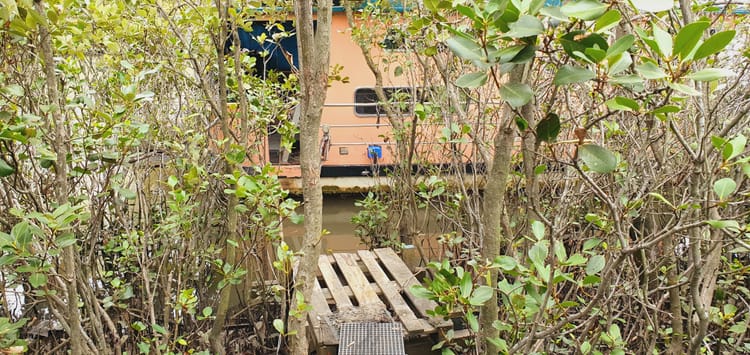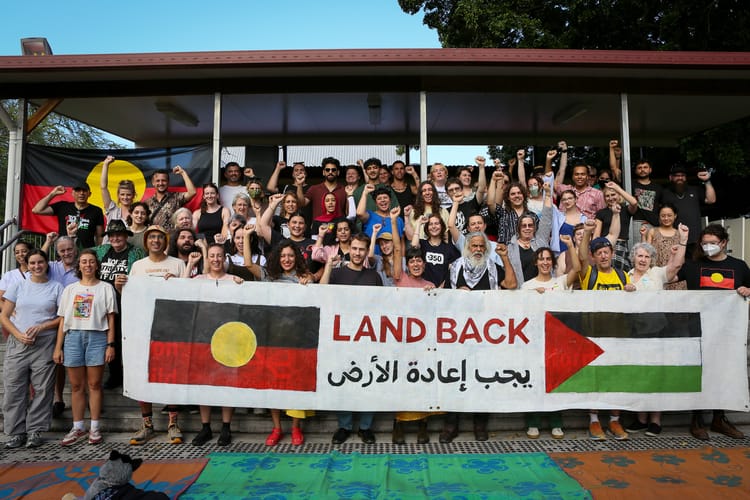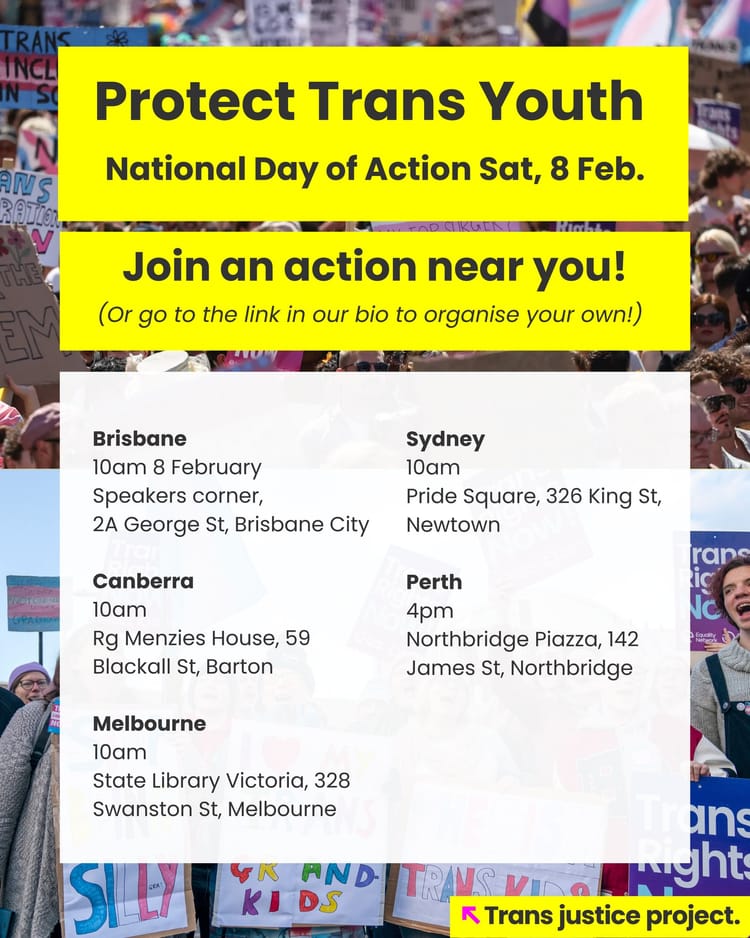Fully Automated Luxury Colonialism
A couple of months ago, the Queensland Greens announced a campaign initiative to increase mining royalties, which would direct a much larger share of mining profits back into paying for public infrastructure and services.
It’s not often that I disagree with Greens campaign announcements, but I have some strong concerns about this one.
The Queensland Greens are proposing a massive increase in royalties from coal, gas, petrol and mineral extraction to make mining companies ‘pay their fair share’. In many respects, this would be a dramatic improvement on the status quo of mining billionaires keeping that wealth for themselves. But is this approach contrary to the rights and interests of First Nations peoples? Does it undermine Indigenous land rights struggles?
"In Australia, the sense of belonging, home and place enjoyed by the non-Indigenous subject ― the coloniser or migrant ― is based on the dispossession of the original owners of the land and the denial of our rights under international customary law. It is a sense of belonging derived from ownership as understood within the logic of capital."
- Professor Aileen Moreton-Robinson, The White Possessive: Property, Power, and Indigenous Sovereignty
The Queensland Greens want to gradually wind down thermal coal mining and other fossil fuel extraction (and have some solid proposals on how to support workers in those fields to transition to other industries), but are still anticipating ongoing mineral mining, and want to keep collecting more revenue from mining long-term.
Right now, private mining companies dig up huge volumes of fossil fuels and minerals and sell them at massive profits, while paying a pittance in royalties. Mining billionaires get filthy rich while millions of people miss out on access to the basic essentials. So I can see why our party would want to advocate for increasing royalties.
There’s potentially a decent argument to go even further and simply nationalise the entire mining industry as some other countries have done… If you believe the minerals are publicly owned resources that belong to all of us, why are we letting private companies dig them up and sell them for profit while only paying a small percentage in royalties back to the public purse?
But there are a couple of significant problems with this outlook…
It’s clearly messed up that private companies can dig up all these resources and sell them for huge profits. After all, the resources don’t even belong to those companies.
But they also don’t actually belong to the wider Australian public.
These non-renewable resources are not publicly owned minerals that belong to all of us equally. They belong to the Aboriginal and Torres Strait Islander communities on whose land and sea territories they’re found.
The reluctance to directly acknowledge and grapple with this question of land rights and resource ownership is one of the fundamental unresolved tensions within the Greens, and in recent years has been a major conflict point within many ‘left’ populist political movements around the world.
If we were serious about our professed commitment to supporting First Nations sovereignty and land (and sea) rights, we would adopt a clear policy platform of giving Aboriginal and Torres Strait Islander community groups veto power over existing and proposed extractive projects.
Indigenous veto power doesn’t necessarily mean that mining would end overnight. But it does mean that First Nations groups would have meaningful control over which projects proceed, and how the profits of any mining projects that do continue are actually used and distributed.
As Associate Professor Chelsea Bond points out, an equal share of ‘collective’ resources is not necessarily the same as sovereignty. “Blackfullas are not seeking a revitalised citizenship that recognises our dignity and humanity – we are insisting upon our sovereignty as First Nations peoples.”

Fighting for Aboriginal communities to have free, prior and informed consent on all mining projects is a small but important step towards reversing the negative impacts of ongoing colonisation. For consent to be genuinely free, the communities giving consent must of course have guaranteed access to the basic essentials of a good life (culturally appropriate housing, education, healthcare, nutritious food etc.) regardless of whether a mine goes ahead.
If First Nations communities did have veto power, some Aboriginal groups would likely choose to end existing projects on their land. Other groups might choose to continue certain mining projects, but would make their ongoing support conditional on receiving a much greater share of the revenue. The point is that this decision-making power should be in the hands of Aboriginal and Torres Islander communities themselves, not politicians in parliament. If a mine was set up on their land without their permission, they should have the power to shut it down (obviously the non-Indigenous government would need to take full responsibility for supporting impacted workers and transitioning them to other projects or industries).
Some ‘social democracy’ and ‘democratic socialism’ political projects rely heavily on extractivism as a form of revenue raising, and in this respect have diverged markedly from decolonisation and Indigenous sovereignty political movements.
I can see why collecting more revenue from mining would be so tempting for so-called progressive electoral campaigns... Instead of getting into messy discussions about debt-funded infrastructure, land tax reform, inheritance taxes, modern monetary theory or even about directly seizing the existing wealth of billionaires, it’s politically a lot easier to talk about just paying for good stuff like public housing and healthcare by digging up and selling minerals.
The debate is perhaps less intense regarding coal mining, because it’s now widely accepted that coal mining has to end at some point soon – the crucial questions are simply about when we end it, who pays to clean up the mess and how best to support mine workers to transition to other industries.
But mineral mining is more contested because although it’s still extremely environmentally destructive, there isn’t the same pressing climate change-related urgency to close down existing mines.
Interestingly (and somewhat inconsistently), there seems to be much more support for First Nations peoples having the power to veto proposed future mining projects, than having the power to shut down existing mines, which is a little arbitrary when you think about it.
Within left-wing circles dominated by white people, I’ve heard three main arguments offered against First Nations peoples having veto power over current and future mineral mining projects, none of which stack up to close scrutiny.
Piss-weak Objection Number 1: "It’s too hard to identify who the rightful Aboriginal landowners are"
This fairly weak response essentially falls back on old-school terra nullius thinking, further punishing people simply for being on the receiving end of colonisation. “If we can’t work out who it belongs to, I guess it’s up for grabs!”
As Professor Aileen Moreton-Robinson puts it, “the premise of colonisation - that Australia belonged to no one - informed the relationship between Indigenous people and the nation-state from its very inception.” This dynamic continues to shape contemporary legal regimes like Native Title, which empower a white bureaucracy to determine the authenticity of Aboriginal and Torres Strait Islander sovereignty while offering only limited resources and power to the communities themselves.
Australia’s current Native Title scheme has undeniably proven to be an unjust and divisive framework, but the failings of the existing system don’t necessarily mean it’s impossible to find a better way of identifying and reaching agreement on who can speak for a particular land or sea territory.
Instead, we can and should flip this on its head, and say “Well this project can’t continue unless you have landowner consent, and if you don’t know who the Indigenous community that’s responsible for this territory is, you need to find out.”
If mine proponents had no choice but to accurately identify Aboriginal landowners before proceeding, you’d probably find that a lot of those ‘impossible to trace’ descendants are actually quite traceable.
Either way, in situations where it really does seem impossible to identify the right spokespeople for a given area of land or sea, any profits from a mining project in that area should be set aside and held in trust until such time as the owners can be identified, rather than spent by non-Indigenous governments or corporations.
This objection to Aboriginal veto power shows the continuing influence of colonialism in shaping the boundaries of what we consider possible. If we think it’s “too hard” to accurately identify the “rightful Indigenous landowners” but we don’t think it’s too hard to dramatically re-organise and re-distribute the resources mined from their lands (and the flow-on profits), then we cannot honestly say that Indigenous sovereignty is a priority of our political movement.
Piss-weak Objection Number 2: "But we need those mineral resources for progress!"
This has become the favourite mantra of many green capitalists and neo-colonial socialists alike. How can we create an ethical, sustainable future without all the aluminium and lithium and copper we need for our solar panels and electric buses!?
Fundamentally, this is a claim that without extracting these minerals, we won’t be able to offer everyone a good life.
This objection to Aboriginal veto power also puts the cart before the horse (or perhaps directly on top of the poor animal). If a certain mineral really is desperately needed by society to lift people out of poverty and/or ‘save the planet,’ it shouldn’t be that hard to convince the First Nations groups whose country the minerals are part of that digging them up is the right thing to do.
Yes, maybe you’d have to pay slightly more for the privilege. And maybe that means the price of those minerals would rise. And maybe that would mean there’s enough pressure to develop alternative technologies that are less dependent on the extraction of non-renewable resources. And maybe that’s not such a bad thing.
“My friend, the poet Mark Tilsen, made a joke when we were discussing what the future would look like. I said, 'Indigenous peoples aren’t protesting the construction of wind turbines and solar panels on their land.' And he replied, 'Yet.'
It’s true: regardless of what the technology is, who has the power to decide how it will be implemented and managed? Who will shoulder the burden of the transition away from fossil fuels? Take those electric cars that run on batteries made from rare earth elements — those elements have to come from somewhere. Those wind turbines have to be built on someone’s land."
- Nick Estes, Water is Life
Throughout history, environmentally destructive resource extraction has been justified in the name of progress and necessity, as has the exploitation and subjugation of native peoples around the world.
When ‘progressive’ political movements assert that a certain resource or practice is unavoidably ‘necessary’ in order for everyone to be able to live ‘a good life,’ they often obscure more foundational conversations about who is getting a meaningful say as to what ‘a good life’ actually involves.
Sure, all that copper and cobalt might be ‘necessary’ for everyone on the planet to own a smart fridge that detects when you’re low on orange juice and automatically orders a resupply to be delivered to your home by an autonomous drone that’s smart enough to fly in through your window. But that’s not my utopia.
Consumption of non-renewable resources by ‘developed’ countries has increased dramatically in recent decades, without yielding any significant improvements to happiness or free leisure time for the majority of workers. To suggest that we can’t give everyone ‘a good life’ without further increasing extraction and consumption of non-renewable resources would be to embrace, rather than challenge, capitalist scarcity mythologies.
There’s a deep-seated “we know what’s best for you” paternalism embodied in the assertion that Indigenous peoples shouldn’t have veto power over mining projects because their mineral resources are ‘essential’ in order to meet everyone’s needs. Are we really suggesting that Aboriginal and Torres Strait Islander communities are too ignorant or selfish to make good decisions about whether the benefits of digging up minerals on their land outweigh the environmental and social costs?
Particularly since the early 2000s, mining industry lobbyists around the world have worked very hard to establish a new common-sense that the continued extraction of non-renewable mineral resources is essential for everyone on the planet to enjoy a high standard of living. They’ve waged a successful propaganda war to convince not just the wider public, but even many environmental NGOs and activists, that we can’t address climate change and end coal mining without digging up more and more of all these other resources. It’s a clever pivot to ensure the continuation of other extractive industries even as coal mining declines.
“There is a need to address the extractivist model because mineral, metal and biomass extraction threaten frontline communities and the interconnected ecologies that sustain life and wellbeing… the mining industry is driving a new greenwashing narrative by claiming that vast quantities of metals will be needed to meet the material demands of renewable energy technologies. This greenwashing narrative serves to obscure and justify the inherently harmful nature of extractivist mining.”
- Benjamin Auciello, A Justice Transition is a Post-Extractivist Transition
Resource industry techno-capitalism has marginalised conversations about how we can shift systems and technologies away from heavy dependence on non-renewable resources. A lot of greenies have fallen for lazy “there are no viable alternatives” arguments, despite the fact that throughout history, thousands of cultures around the world have demonstrated hundreds of different ways of leading rich, healthy, meaningful lives without rapidly depleting non-renewable resources.
Ultimately what I find so disappointing about this whole line of argument is that it unnecessarily pits people against one another. The implication is that we can only guarantee everyone ‘a good life’ by undermining Indigenous sovereignty. But a truly radical political project would avoid the trap of thinking the two goals are irreconcilable.
Piss-weak Objection Number 3: "Ok maybe we don’t actually need the mineral resources themselves, but we need the money to pay for the other parts of our utopian vision!"
This is ultimately where I think most ‘leftwing’ objections to Aboriginal veto power really stem from. The Greens have a 'bold vision' to create more public housing, better healthcare, better education systems and all sorts of other great stuff. But do we really have such limited imaginations that we can’t conceptualise any way to deliver all these important public services other than paying for them by mining non-renewable resources?
We live in an unjust and unequal society, where wealth is hoarded by a privileged minority while millions of people miss out on access to the basic essentials needed to live a good life. Mining billionaires have become obscenely wealthy by screwing over workers and Aboriginal landowners alike, as have other mega-wealthy individuals across a range of industries.
But selling more minerals (or at least collecting royalties) doesn’t actually redistribute any of that existing wealth. And in fact it pushes aside important conversations we need to have about how government can and should fund infrastructure and services sustainably, how we can claw back the super-profits that have already been funnelled offshore through dodgy tax havens, and how we can advocate for less government spending on stupid and unnecessary stuff like fighter planes and prison expansions.
There’s an important distinction between reapportioning anticipated wealth that we expect will be amassed in the future, and redistributing the existing wealth that has already been accrued by the richest 0.1%.
There’s nothing particularly bold, radical or transformative about digging up and selling minerals to raise public revenue. It might seem or feel bold in a Queensland context, where our imaginations have been stunted and disciplined by decades of neoliberal capitalism and colonisation, but it’s hardly revolutionary. At best, it’s neo-colonial extractivist state capitalism.
My point here is that even if you don’t want to dramatically transform and reimagine how governments deliver stuff, or explore ideas like modern monetary theory (which admittedly is more relevant to national governments) there are many ways for state governments to raise revenue and pay for public infrastructure and services without stealing directly from First Nations peoples. Heck, Gina Rinehart’s personal net worth is estimated at around $22 billion. Maybe we could take some of that somehow!?
“But lots of people are homeless and we need the money for public housing!” can seem a powerful and emotive argument to deploy against First Nations veto power over mining projects. But it’s also a very lazy one. If we need more money to fund better healthcare or public housing, one of the first places we should be looking is the huge State Government budget allocations for the Queensland Police ‘Service’ and the prison industrial complex. Before we even consider supporting a policy regime that sells Aboriginal land without owners’ consent, we should slash a few billion a year from those budgets and see what kind of positive impact that makes on poverty and community capacity.
Instead of taking even more from the most marginalised and oppressed groups in our society, we should be putting in the time and intellectual work to find alternative ways to deliver the essential services we all need. And if we honestly cannot conceive any possible way of paying for more public housing and better healthcare without continuing ecologically destructive mining that doesn’t have the support of Aboriginal landowners, then maybe that should prompt a deeper re-examination of the viability and scalability of the vision we’re advocating.
If you’re intent on keeping within the broad parameters of our existing economic system, you’re inevitably going to have to make tricky choices about what potential revenue streams are on the table when deciding how you’re going to fund a big social democracy program. Clearly extracting profits by stealing wages and under-paying workers in state-owned industries should be off the table. So too would selling off publicly-owned services to the corporate sector (e.g. the privatisation of telecommunication infrastructure, electricity providers, public transport etc). Selling off resources owned by Aboriginal and Torres Strait Islander people without their free, prior and informed consent falls within the same category. It shouldn’t even be up for discussion.
Broader strategic implications
If this was just another campaign initiative on the Greens website, I probably wouldn’t have bothered writing an entire article about it. But it becomes a greater concern because the Queensland Greens are relying on this mining royalties initiative as the basis for funding several of our other major initiatives.
“Why does all of this matter?” you might ask. “After all, the Greens only hold one seat in the Queensland Parliament, and it’s not like we’ll actually be able to implement a massive increase in mining royalties in the next few months.”
But we are quite close to holding the balance of power in Queensland. And if, after the October election, we end up with Labor relying on the support of three or four Greens MPs to pass legislation, there’s a real risk of the Greens being wedged and co-opted if we don’t have a strong, unequivocal position on land rights.
What will we do when an Aboriginal community group comes to the Greens calling for support to shut down a mine on their country, and Labor says they’ll happily agree to closing the mine if we’ll support a cut in wages for frontline healthcare workers? Labor certainly isn’t above playing those kinds of games, and would relish the opportunity of forcing the Greens into politically toxic choices (even if those choices are arbitrarily constructed false dichotomies).
To claim to support Aboriginal land rights, while also relying on the ongoing violation of Aboriginal land rights as a cornerstone revenue source for your political program, is clearly an awkward position. But calling for increases to mining royalties (rather than firmly backing unequivocal Aboriginal veto power and 100% Aboriginal control over mining profits) is a weak, short-sighted strategy for other broader reasons.
For one, it unnecessarily corners the Greens as a political party into a position of antagonism and direct conflict with Aboriginal land rights activists and their non-Indigenous allies. Rather than building a broader coalition of diverse communities who can unite behind a common vision for society, it reinforces divisive colonial logics, suggesting that the ‘common good’ can only be advanced through subordinating Aboriginal rights and demands yet again.
But the damage to Aboriginal land rights movements is even more severe when you consider the specific role the Greens currently play in the Australian political landscape... We are the political party that is supposed to articulate bold ideas and radical alternative visions for society. We’re the ones who strive to continually broaden the parameters of debate, and win seats in the process. If even the Greens are calling for an increase to mining royalties as the only way to fund a better life for all of us, we further delegitimise already-marginalised demands for recognition of First Nations sovereignty and land rights.
We are also hamstringing the potential to build internationalist coalitions that unite around shared political visions of how to deliver a good life not just for Queenslanders, but for everyone around the world. Most regions of the globe don’t have high-value non-renewable resources that they can easily sell off to pay for public housing and healthcare. So instead of being an example for other radical political projects to emulate, we could be inadvertently reinforcing the message for poorer nations that extractivism is the only viable pathway to address poverty and lack of access to essential services.
If it can’t be emulated in other parts of the world that lack vast reserves of mineral resources, this aspect of the political utopia the Queensland Greens are articulating might not be so transformative or universalist after all.
A further concern is that the policy demand is arguably so modest that it does not meaningfully and directly challenge capitalist hegemony. By saying “Sure, profit-driven corporations can keep digging up and selling Aboriginal-owned minerals, as long as we can get a larger percentage in royalties,” this arguably serves as a tacit endorsement of private companies continuing to extract wealth through mining. If the Queensland Greens call for a mineral mining royalty rate of 20%, that’s going to be interpreted by many as an ambit claim upper-limit maximum (to be fair, it’s a massive increase on the current royalty rate of 2.5% for most metals). In the current political landscape, for the Greens to call for a 20% royalty rate is a suboptimal strategy in the same way that only calling for a $75 increase to Newstart was a suboptimal strategy. We are setting the bar too low.
Ultimately, in an Australian context, the various ‘leftwing’ arguments against First Nations veto power eventually seem to dissolve into nothing more than an ill-conceived political pragmatism i.e. “We know it’s bad, but this is the only way we can build a broad enough coalition of supporters to win seats and take power away from more conservative parties.” It’s effectively the same line of argument that Labor resorts to in defending its support for turning away refugees - Labor can’t imagine any pathway to winning more seats other than to publicly commit to a policy position which they acknowledge is ethically compromised and throws already vulnerable and marginalised communities under the bus.
Mainstream electoral politics inevitably involves a lot of compromising. The Greens have to be ruthlessly strategic about what messages and ideas we prioritise and promote, because if we fail to win seats, we probably won’t change anything for the better. But in deciding what compromises we are and aren’t willing to make, we necessarily have to draw some clear lines. Refusing to legitimise the direct and active violation of fundamental Indigenous rights should surely be one of these. Otherwise, what the hell are we even fighting for?
These ideas can be frustrating and inconvenient to grapple with in the fast-paced world of election campaigning, where every policy initiative needs to be simple enough to summarise on a flyer, and any critique of party orthodoxy is potentially demotivating and distracting. When we only have a few months to develop a clear campaign platform, explain it to volunteers and then rush them out the door to start selling our vision to voters, it's easy to see how conversations like this could be sidelined continually, year after year. But that doesn't mean they're not important.
A campaign platform that can be summarised as "give everyone lots of great stuff and make mining companies pay for it by increasing royalties" is clearly going to be a vote-winner with a lot of people. But when you drill down into the detail, it's not really mining companies who would be paying for that vision at the end of the day - it would be the First Nations peoples who are the rightful owners of the lands and seabeds that the resources are extracted from. That's not undoing 200+ years of colonisation, theft, exploitation and genocide: It's repeating the same mistakes while disguising them as something new.
I accept that we don’t have a lot of time to transition away from coal mining and fossil fuel-intensive industries.
I also accept that it will be a lot easier to win broad public support for a transition away from fossil fuels if we are simultaneously articulating a policy platform that creates jobs in sustainable industries and delivers more public housing, better healthcare, and all sorts of other public service improvements.
But I refuse to accept an irrationally narrow framing of political possibilities that insists we can’t create a better world unless we are continually deprioritising the demands and struggles of the most oppressed and marginalised groups in our society.
We can dream bigger than that.
Hi! Thanks for reading! If you appreciate articles like this being freely available to the general public, please consider signing up for a $1/week paid subscription (or more if you can afford it) so I can make more time to focus on this kind of research and commentary.





Member discussion